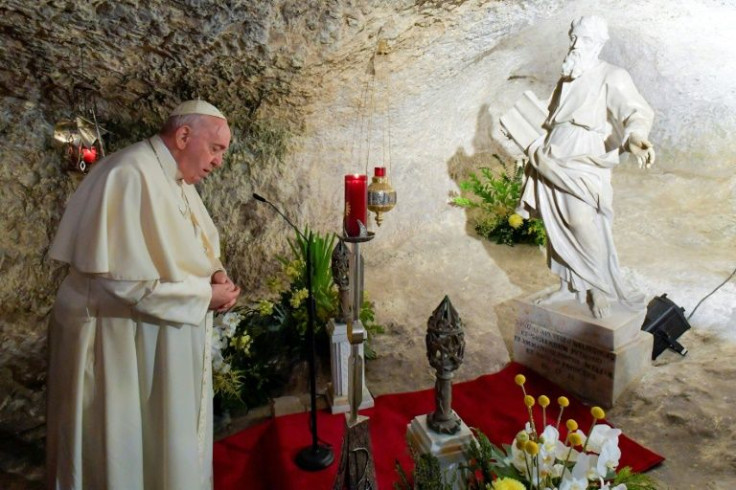Pope Laments 'Tormented Ukraine', Defends Migrants On Malta Trip
Pope Francis decried the "sacrilegious war" in Ukraine on Sunday as he wrapped up a two-day trip to Malta that bore a pointed pro-migrant message and drew his sharpest rebuke yet of Russia's invasion.
His condemnation came amid international outrage over the killing of civilians near the Ukrainian capital Kyiv, after officials in Bucha said nearly 300 bodies were found in mass graves following the withdrawal of Russian forces.
"Let us pray for peace, thinking of the humanitarian tragedy of tormented Ukraine, still under the bombardments of this sacrilegious war," Francis said after an open-air mass to an estimated 12,000-strong crowd in Floriana, near Valletta.
The 85-year-old has condemned the violence in increasingly emotive terms without ever directly blaming Russia or its president, Vladimir Putin.
But on Saturday, in the Maltese capital Valletta, he came the closest yet, warning that "some potentate, sadly caught up in anachronistic claims of nationalist interests, is provoking and fomenting conflicts".
The war has overshadowed Francis's first trip to Malta but also added urgency to a key theme of his nine-year papacy -- the need to welcome those fleeing war, poverty or the effects of climate change.
Russia's invasion of Ukraine has triggered Europe's worst refugee crisis since World War II, a continent already struggling to form a coherent response to thousands of people arriving by sea each year from North Africa.
Catholic-majority Malta, a tiny archipelago located off the coast of Sicily, is on the frontline of that influx but has been accused by charities of turning a blind eye to those in distress in its waters.
In an emotional visit before flying out Sunday, Francis visited a Catholic-run migrant centre where he heard testimonies from young men who arrived on Malta's shores, and embraced them.
He said the world must imagine "that those same people we see on crowded boats or adrift in the sea, on our televisions or in the newspapers, could be any one of us, or our son or daughter."
Before an audience of around a dozen African migrants, clergy and volunteers gathered at the John XXIII Peace Lab, he noted that just on Saturday, news arrived of more than 90 people drowned in the Mediterranean, with just four survivors.

He drew applause from the crowd when, in a veiled reference to Libya, he said many migrants' rights were violated on their long journeys, often "with the complicity of the competent authorities".
"You are not numbers," the pope told them.
He had previously urged Malta to do more to welcome desperate people who arrive on the archipelago, living up to its status as a "safe harbour" that in the first century AD welcomed the Apostle Paul who shipwrecked here.
One of 55 undocumented Africans living at the centre told AFP he has been waiting for two years for his identity papers, and until they arrived, he could do nothing but wait.
"I haven't seen my parents for five years. That's huge," said Debosque, a 24-year-old from Cameroon who did not want to give his last name.
The migrant centre is readying to receive some refugees fleeing the war in Ukraine, and outside, members of Malta's Ukrainian community urged the pope to keep speaking out.
"We would like him to bless our country," said Olga Attard, 36, standing with her daughter in a crowd filled with yellow and blue Ukrainian flags.
"People of his level and power, they can make a difference in such a situation," she added.
Francis said early in the trip that a potential visit to Kyiv was "on the table" and returning to Rome Sunday on the papal plane, he told reporters that he "said it with sincerity that I was thinking of going there."
"I don't know if it can be done... or if doing it would be for the best," he acknowledged.
The pope, who last summer underwent colon surgery and cancelled an event in February due to acute knee pain, walked with difficulty throughout the trip, limping and taking the arm of a helper at his side. His knee, he told reporters, was "a little annoying but it's getting better".
Anna Balzan, 67, draped in a Vatican flag purchased during John Paul II's 1990 visit, expressed concern for Francis' health, saying he looked "very tired yesterday".
But he has been given a warm welcome.
"He's a sign of hope in a time when nobody seems to believe anything any more," said Isabella Dorgu, 38, an Italian living in Malta, as she strained for a view of the pope at the mass.
© Copyright AFP 2024. All rights reserved.





















